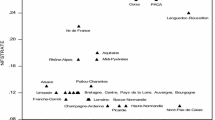Abstract
The purpose of this paper is to reconcile the seeming paradox emerging in the literature relating unemployment to new-firm startup activity and the decision to enter into self-employment. On the one hand time series studies have generally found that entrepreneurship is promoted by high levels of unemployment. On the other hand, cross-sectional studies have generally found that startup activity tends to be depressed where unemployment is high. We present a model derived from Knight's theory of individual choice in order to reconcile this apparent paradox. Assuming presence of an economy-wide demand shock and industry-specific shocks, the model indeed predicts the relations between new firm startup and unemployment which are found in empirical analysis. Hence, instead of blaming specification errors or unobserved policy changes, the seeming paradox can be reconciled by solid economic theory.
Similar content being viewed by others
References
Audretsch, David B. and Zoltan J. Acs, 1993, ‘Entrepreneurial Activity, Innovation, and Macroeconomic Fluctuations’, in Y. Shionoya and M. Perlman (eds.),Innovation in Technology, Industries, and Institutions: Comparative Perspectives, Ann Arbor: University of Michigan Press.
Audretsch, D. and M. Fritsch, 1992, ‘Market Dynamics and Regional Development in the Federal Republic of Germany’, Discussion Paper FS IV 92-6, Wissenschaftszentrum Berlin.
Coombes, M. G. and S. Raynold, 1989, ‘Developing a Local Enterprise Activity Potential (LEAP) Index’,Built Environment 14(2), 107–117.
Dahrenmöller, A., 1987,Existenzgründungsstatistik: Nutzung amtlicher Datenquellen zur Erfassung des Gründungs-geschehens, Stuttgart: C. C. Poeschel.
Evans, D. and L. Leighton, 1990a, ‘Some Empirical Aspects of Entrepreneurship’, in Z. Acs and D. Audretsch (eds.),The Economics of Small Firms: A European Challenge, Boston: Kluwer Academic Publishers, pp. 79–97.
Evans, D. and L. Leighton, 1990b, ‘Small Business Formation by Unemployed and Employed Workers’,Small Business Economics 2(4), 319–330.
Evans, D. and B. Jovanovic, 1989, ‘Estimates of a Model of Entrepreneurial Choice under Liquidity Constraints’,Journal of Political Economy 95(3): 657–674.
Hamilton, R. T., 1989, ‘Unemployment and Business Formation Rates: Reconciling Time Series and Cross Section Evidence’,Environment and Planning 21, 249–255.
Hughes, A., 1993, ‘Industrial Concentration and Small Business Sector in the UK: the 1980's in Historical Perspective’, in Z. Acs and D. Audretsch (eds.),Small Firms and Entrepreneurship: An East-West Perspective, Cambridge: Cambridge University Press, pp. 15–37.
Hunsdiek, D. and E. May-Strobl, 1986, ‘Entwicklungslinien und Entwicklungsrisiken neugegründeter Unternehmen’, Bonn: Institut für Mittelstandsforschung.
Jovanovic, B., 1993, ‘Entrepreneurial Choice When People Differ in Their Management and Labor Skills’,Small Business Economics 5(4).
Knight, F. H., 1921,Risk, Uncertainty and Profit, New York: Houghton Mifflin.
Moyes, A. and P. Westhead, 1990, ‘Environments for New Firm Formation in Great Britain’,Regional Studies 24(2), 123–136.
Reynolds, P., 1990, ‘US Regional Characteristics, New Firms and Economic Growth’, Presented to Cross National Workshop on the Role of Small and Medium Enterprises in Regional Economic Growth, University of Warwick.
Reynolds, P., 1993, ‘Regional Characteristics Affecting Autonomous Branch Establishment Foundings in the US, 1976–1986’, in B. Johannisson, C. Karlsson and D. Storey (eds.),Small Firm Dynamics: International, National and Regional Perspectives, London: Routledge.
Storey, D. J., 1991, ‘The Birth of New Firms — Does Unemployment Matter? A Review of the Evidence’,Small Business Economics 3(4), 167–178.
Storey, D. J. and A. M. Jones, 1987, ‘New Firm Formation — A Labor Market Approach to Industry Entry’,Scottish Journal of Political Economy 34(1), 37–51.
Whittington, R. C., 1984, ‘Regional Bias in New Firm Formation in the UK’,Regional Studies 18(4), 253–256.
Author information
Authors and Affiliations
Rights and permissions
About this article
Cite this article
Audretsch, D., Jin, J. A reconciliation of the unemployment — New firm startup paradox. Small Bus Econ 6, 381–385 (1994). https://doi.org/10.1007/BF01065141
Received:
Issue Date:
DOI: https://doi.org/10.1007/BF01065141




